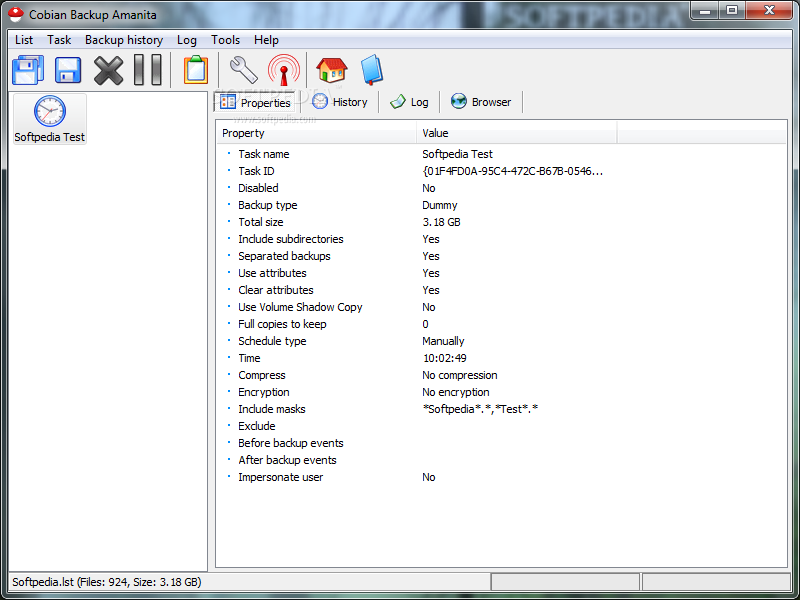
- COBIAN BACKUP GMAIL SMTP SETTINGS PC
- COBIAN BACKUP GMAIL SMTP SETTINGS TV
- COBIAN BACKUP GMAIL SMTP SETTINGS DOWNLOAD
- COBIAN BACKUP GMAIL SMTP SETTINGS WINDOWS
"Linux is very popular, as long as no one needs to know it is thereâ€. I said to a friend, regarding the Tom-Tom lawsuit,
COBIAN BACKUP GMAIL SMTP SETTINGS WINDOWS
It isn't even really fair to use those numbers when comparing Windows installs to Linux installs. There is no conceivable way this is a threat to Microsoft. Often, the Linux is so transparent that as a data-center administrator, you may not even know that Linux is in your data center. Effectively, Linux is an appliance in this role, and the LINUX is not as important as the role of the appliance. It occurs to me that Microsoft really doesn't care when Linux "grows†enterprise market share, because it is the OS under the interface of the new IBM XIV storage solution. Most importantly, once we get down to the nuts and bolts of it, I think Microsoft does very little competition on the infrastructure side of the enterprise, such as DNS, Active Directory, DHCP, and Web/IIS.
COBIAN BACKUP GMAIL SMTP SETTINGS DOWNLOAD
I think that Linux numbers we see count every download by every curious user who may or may not ever get around to installing their download on an actual physical machine. I think the Linux community takes these artificially inflated numbers and compares them to Microsoft's Windows desktop and data center numbers. The number of Linux machines becomes grossly inflated through several methods, many of which do not compete with Microsoft technologies and actually assist Microsoft while keeping Microsoft's real competitors tied up worrying about additional competition.įor example, I've got a feeling that the Linux numbers we see count every embedded Linux device - consumer or otherwise - available on the market. But I think it is clear, more than 9 out of 10 PCs you run into in the private and public sector outside of very narrow niche industries are going to be Windows-based. Some people claim that I have conformational bias - that I see more Windows because I work in a Windows-biased segment of the industry. And that isn't about Linux versus Windows reliability - it's about applications, and we all know Linux apps crash as frequently (or more than, in the case of KDE) as Windows apps.
COBIAN BACKUP GMAIL SMTP SETTINGS PC
When you're in the Build a Bear workshop and a PC is down, it isn't Gnome that the app crashes back to.
COBIAN BACKUP GMAIL SMTP SETTINGS TV
When you're cable TV guide has crashed, it isn't Linux.

But I've seen very little Linux, scattered here and there, and often in strange, supporting network and infrastructure roles.Īnother (ironic) example I use is that when you see a giant LCD on the Vegas strip that has crashed, it isn't LINUX you see underneath it. With 15 years of experience, I've seen Sun Solaris heavy data centers, I've seen HP-UX heavy data centers, and I've seen LOTS of big corporations with huge Windows deployments. Whenever I hear figures on the number of datacenters with huge Linux deployments, I always wonder where all of these data-centers are. I don't think the Linux community lies, but I don't think they make accurate or fair comparisons.

But then again, people have been running into trouble by speaking the truth in religious organizations for centuries.Īnd therein lays another problem. Speaking the truth in the Church of Linux is an excellent way to get ex-communicated. I also think the Linux community has a natural desire to avoid facing these facts, and that as a community, it would often rather embrace a fantasy world where Ubuntu is really a compelling alternative to a Windows OS that could threaten to disrupt Microsoft dominance. I think it stings the Linux community to hear things like this put so bluntly.

Unfortunately, that is exactly what Linux does when it tries to compete directly with Windows on the desktop OS platform in areas like Plug-and-Play support for the widest variety of consumer accessories. Certainly my opponent is the BETTER choice for foreign policy, but hey, I'm a NICER guy, and even if I'm not as good, I'm much better than I used to be". " My opponent claims that I am inferior to him in foreign policy, and while this may be true, I have made SIGNIFICANT advances in my foreign policy skills. If I were a politician, I wouldn't campaign by claiming: In my own defense, I don't think I am "anti-Linux" I think the main problem is that the Linux community pictures itself as a looming threat directly to Microsoft "dominance".įrankly, Linux spends too much time directly trying to compare itself to Microsoft in areas where Microsoft dominance is virtually insurmountable, and where Linux, despite significant advances, finds itself (relatively) lacking.

I'm fairly frequently accused of being a Microsoft Fanboy or Corporate Stooge for what it seems many Linux fans mistake as an "anti-Linux†philosophy and outlook.


 0 kommentar(er)
0 kommentar(er)
